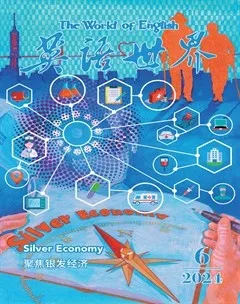A Brief History of Peking Opera京剧简史
2024-06-10高萨丽/文张祺/译
高萨丽(音译)/文 张祺/译
Peking Opera is a form of traditional Chinese theater that originated in Beijing in the late 18th century. Compared to other types of Chinese theater, it is a relatively new style of drama, combining music, song, dance and acrobatics in a lively and colorful display.
京剧起源于18世纪末的北京,是中国传统戏剧的一种。相较于中国其他剧种,它集音乐、歌曲、舞蹈和杂技于一体,表演生动活泼、丰富多彩,属于一种相对较新的戏剧艺术表现形式。
The birth year of Peking Opera is commonly set at 1790, the year of the eightieth birthday of the Qianlong Emperor. Up until that point in the early Qing dynasty (1616–1911), the educated nobility favored Kunqu Opera, which was known for its elegant music and fine language. On the other hand, various styles of regional popular theater enjoyed by commoners were dismissed by the Chinese elite.
通说认为京剧诞生于1790年,即乾隆皇帝八十大寿那一年。在此之前,清朝(1616—1911)初年,受过良好教育的皇室贵族都偏好以行腔婉转、曲词典雅著称的昆曲。相反,广受平民百姓追捧的风格各异的地方流行剧却受到名门望族排斥。
That changed in 1790, when four seasoned drama troupes from Anhui province entered the capital to perform for the imperial court in celebration of Qianlongs birthday. The occasion marked the first time regional popular theater was performed in Beijing. The four troupes later came to be known as the ‘four great Anhui companies, and together dominated Peking Opera for the next century.
这种局面自1790年起逐渐扭转。当时,来自安徽省的四个经验丰富的戏班为庆祝乾隆帝的生日,进京为朝廷演出。那是地方流行戏曲首次在北京演出。后来,这四个戏班被称为“四大徽班”,并在接下来的一个世纪中共同主导了京剧的发展。
In the early years of Peking Opera, all the actors were men, with the roles of women played by young boys. The stories fell into two main categories—wen, or civil theater, which focused on love, marriage and other civilian concerns, and wu, or military theater, which revolved around the theme of war and was known for featuring thrilling acrobatic feats.
早期京剧仅有男性参演,剧中的女性角色由男孩扮演。京剧故事主要分为两大类——文戏和武戏,前者侧重于爱情、婚姻和其他民间生活中的问题,后者则主要围绕战争主题,以惊险刺激的杂技表演著称。
Peking Opera is a scenic art integrating music, performance, literature, aria, and face-painting. Certain rules are set up and regulations are standardized during many artists long practice on stage. Different from regional plays, it is stricter on the variety of the workmanship. The combination of virtual and reality—a special technique of expression, keeps it largely free from the restriction of time and space on stage performance. Peking Opera has had many interesting names since it came into being, such as Jinghuang, Daxi, Pingju, Jingxi.
京劇是集音乐、表演、文学、咏叹调、脸谱于一体的舞台艺术。在众多艺术家长期的舞台实践中,已然形成一定的规则和规范。与地方戏不同,它对技艺的要求更为严格。虚实结合的特殊表现手法,使其在很大程度上摆脱了舞台表演的时空限制。京剧自诞生以来就有许多有趣的名字,如京簧、大戏、平剧、京戏等。
In the 19th century, a theater district established itself in central Beijing, just south of the Imperial City. The playhouses also functioned as tea houses, and patrons were served food and tea as they enjoyed the shows. Notably, the powerful Empress Dowager Cixi (1835–1908) was an enthusiastic patron of Peking Opera. She had two stages built in the Summer Palace, as well as a smaller stage in her private quarters, and often summoned the citys most gifted artists to the royal palace to perform for her.
19 世纪,在紫禁城正南面的北京中心地带形成了一个戏院区。这些戏院兼具茶馆的功能,观众在欣赏演出的同时还能用膳品茗。值得一提的是,權倾朝野的慈禧太后(1835—1908)是京剧迷。她在颐和园搭建了两个戏台,并在自己的私人住所搭建了一个较小的戏台,经常召集京城最有才华的艺术家到皇宫为她演出。
1900, the year of the Boxer Rebellion, marked a calamitous turning point for Peking Opera. All of the capitals great theaters were burned down during the uprising, including two of the original ‘four great Anhui companies that had survived until that year.
1900年,义和团运动的爆发成为京剧一个灾难性的转折点。义和团起义期间,京城所有的大戏院都被烧毁,包括“四大徽班”中剩下的两个。
In the aftermath of the catastrophe, with the old opera companies dissolved, individual veterans struck out on their own. Artists began to experiment with different styles, muddling traditional Peking Opera with influences from Western drama. The performances also began to take on contemporary political themes or advocate for social reform.
这场毁灭性灾难过后的一段时间里,随着老戏班的解散,个别老艺人开始自立门户。他们逐步尝试不同的风格,将部分西方戏剧的元素融入传统京剧,演出主题也开始涉及当代政治、倡导社会改革。
In the first half of the twentieth century, the most famous actor of Peking Opera was Mei Lanfang. A maestro of the stage, Mei played a key role in popularizing Peking Opera and introducing Chinese theater to the West. He performed in the United States in 1930 and Europe in 1935, where he made a great impression on the German dramatist Bertolt Brecht, enough to influence Brechts concept of alienation. Mei also took the bold step of taking on female students, which was a highly risky and unconventional step at the time.
20世纪上半叶,最著名的京剧表演艺术家当属梅兰芳。作为舞台艺术大师,梅兰芳在推广京剧和向西方介绍中国戏剧方面发挥了关键作用。他于1930年、1935年分别在美国和欧洲演出,给德国戏剧家贝托尔特·布莱希特留下了深刻印象,并影响了布莱希特的间离思想理论。此外,梅兰芳打破常规做法,冒着巨大的风险招收女学徒,在京剧发展的道路上大胆地向前迈出了一步。
After the founding of the Peoples Republic of China in 1949, Peking Opera performances that dealt with contemporary themes were encouraged, and the lively art form continues to be performed today.
1949年中华人民共和国成立后,国家鼓励京剧演绎当代社会与生活。由此,这种生动活泼的艺术形式一直延续至今。
(译者为“《英语世界》杯”翻译大赛获奖者)
